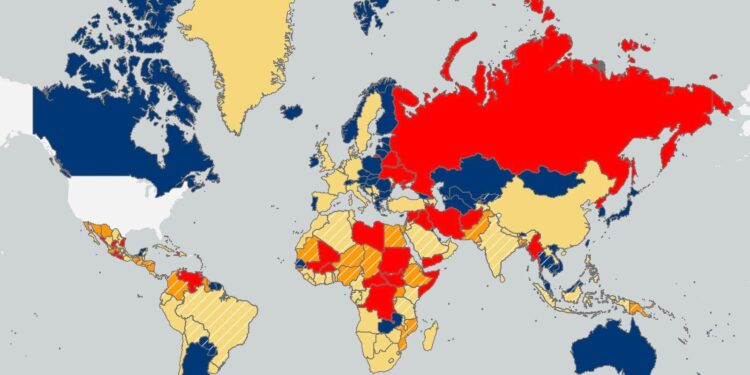The U.S. Department of State has recently updated its travel advisory for Greece, reflecting new assessments that travelers should consider before planning their visit. As Greece continues to welcome international tourists, these changes aim to provide timely information on safety, health, and local conditions. This article breaks down the latest advisory details, offering essential guidance for Americans preparing to explore the historic sites, vibrant cities, and scenic coastlines of Greece.
U.S. Revises Travel Advisory for Greece Amid Safety Concerns
The U.S. Department of State has recently updated its travel advisory for Greece, highlighting several safety concerns that travelers should be aware of. The revision points to an increase in petty crime, including pickpocketing and scams targeting tourists, especially in urban hubs like Athens and Thessaloniki. Visitors are urged to stay vigilant in crowded places and avoid displaying valuables openly. Additionally, locals have reported occasional demonstrations and strikes which could disrupt public transportation and essential services without prior notice.
Key precautions for visitors:
- Keep passports and important documents secure at all times.
- Avoid political gatherings and protest areas to minimize risk.
- Use trusted transportation options and be cautious when hailing taxis.
- Stay informed of local news and government advisories throughout your stay.
| Region | Primary Concern | Advice |
|---|---|---|
| Athens | Pickpocketing near tourist sites | Keep valuables out of sight |
| Thessaloniki | Protests and strikes | Avoid large gatherings |
| Islands (Santorini, Mykonos) | Tourist scams | Use official services only |
Key Risks and Areas to Avoid According to the Latest Guidance
Travelers should exercise heightened vigilance in specific regions of Greece where recent advisories have flagged potential security concerns. According to experts, certain border areas near Turkey and Albania have seen increased patrols and occasional tensions, making them less suitable for casual visits. Visitors are urged to avoid demonstrations and large public gatherings, particularly in urban centers like Athens and Thessaloniki, where political protests can escalate unexpectedly. Additionally, petty crime such as pickpocketing remains a persistent issue in crowded tourist hotspots; maintaining awareness and safeguarding personal belongings is strongly recommended.
Beyond these considerations, there are safety tips regarding natural conditions and local customs that should not be overlooked. Wildfires during summer months pose a seasonal risk, especially in rural and forested zones of the Peloponnese and eastern Crete. It’s advised to stay informed about regional weather alerts and adhere to any evacuation orders. Furthermore, visitors should respect localized cultural sensitivities-such as dress codes near religious sites and care during observance of national holidays-which can help avoid misunderstandings or conflicts.
Essential Preparations and Tips for American Travelers Visiting Greece
Travelers from the U.S. should ensure they have valid passports with at least six months’ validity beyond their anticipated stay in Greece. While no visa is required for visits under 90 days, registering with the U.S. Embassy’s Smart Traveler Enrollment Program (STEP) is highly recommended to receive important security updates. Additionally, it’s wise to purchase comprehensive travel insurance that covers unexpected medical expenses, as healthcare services in Greece may require upfront payments.
Key tips for a smooth trip include:
- Familiarize yourself with local customs and basic Greek phrases to enhance communication.
- Plan transportation in advance, particularly when visiting popular islands or rural areas, as options can be limited.
- Monitor the latest U.S. travel advisories and local news for any sudden changes or alerts.
| Category | Recommended Action | Notes |
|---|---|---|
| Documentation | Verify passport validity | At least 6 months beyond travel dates |
| Health | Get travel insurance | Include COVID-19 and emergency coverage |
| Communication | Enroll in STEP program | Receive alerts and embassy updates |
Concluding Remarks
As the U.S. revises its travel advisory for Greece, prospective travelers are encouraged to stay informed of the latest guidelines and safety recommendations. Keeping abreast of these updates will help ensure a smooth and secure visit to this popular Mediterranean destination. For more detailed information and ongoing developments, travelers should consult official resources ahead of their journey.
















